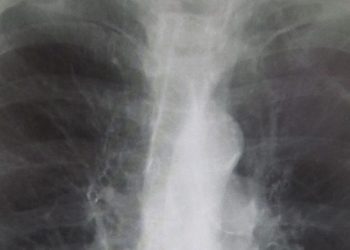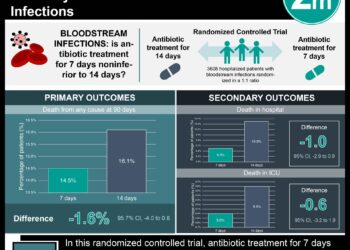Azithromycin not effective in acute asthma exacerbations: The AZALEA trial
1. According to this randomized, double-blind, placebo-controlled trial carried out in the United Kingdom, there was no significant difference in symptom scores in adults with acute asthma exacerbations when prescribed azithromycin compared with placebo.
2. This study had recruitment issues since almost half of screened participants were excluded due to recent antibiotic use, which introduced selection bias.
Evidence Rating Level: 2 (Good)
Study Rundown: Antibiotics are generally not included in the management of acute asthma exacerbations. However, a recent study evaluated the addition of telithromycin and showed benefit, but liver toxicity limited its use. It is unclear if other macrolides can provide the same benefit with fewer adverse effects. This randomized controlled trial investigated the effectiveness of azithromycin treatment when added to standard care of adults with acute asthma exacerbations.
The administration of azithromycin in an adult acute asthma exacerbation did not result in a significant difference in symptom scores. There was also no significant difference in quality of life questionnaires or lung function testing between the azithromycin and placebo groups. Strengths of this study included the randomized, controlled study design. However, there was a high exclusion rate because 44.6% of screened individuals had already received antibiotics and thus the examined sample may not be representative of the population in question.
Click to read the study, published today in JAMA Internal Medicine
Relevant Reading: The Effect of Telithromycin in Acute Exacerbations of Asthma
In-Depth [randomized controlled trial]: AZALEA was a randomized, double-blind, placebo-controlled clinical trial that took place in the United Kingdom from September 2011 to April 2014 to evaluate the effectiveness of azithromycin in acute asthma exacerbations. Inclusion criteria were adults with a documented history of asthma for more than 6 months who presented to an emergency medical care center with an acute asthma exacerbation requiring a course of steroids and a peak expiratory flow or forced expiratory volume of <80% predicted. Exclusion criteria were use of oral or systemic antibiotics within 28 days of enrollment, substantial lung disease other than asthma, and known prolonged QT interval. The primary outcome of interest was diary card summary symptom scores, which took into account symptoms such as wheezing, breathlessness, coughing assessed at 10 days after randomization. Secondary outcomes included the Acute Asthma Quality of Life Questionnaire score and numerous lung function variables. The data was analyzed using an intention-to-treat protocol and Cox hazards regression.
A total of 4582 patients were screened and 199 were randomized. A major reason for non-recruitment was receipt of antibiotics within 28 days prior to the study. The primary outcome of asthma symptom scores did not significantly differ between azithromycin and placebo groups at day 10 (difference -0.166; 95%CI -0.670 to 0.337). There was also no significant difference between groups when comparing the Acute Asthma Quality of Life Questionnaire scores or lung function testing between the exacerbation day and day 10.
Image: CC/Wiki
©2016 2 Minute Medicine, Inc. All rights reserved. No works may be reproduced without expressed written consent from 2 Minute Medicine, Inc. Inquire about licensing here. No article should be construed as medical advice and is not intended as such by the authors or by 2 Minute Medicine, Inc.







